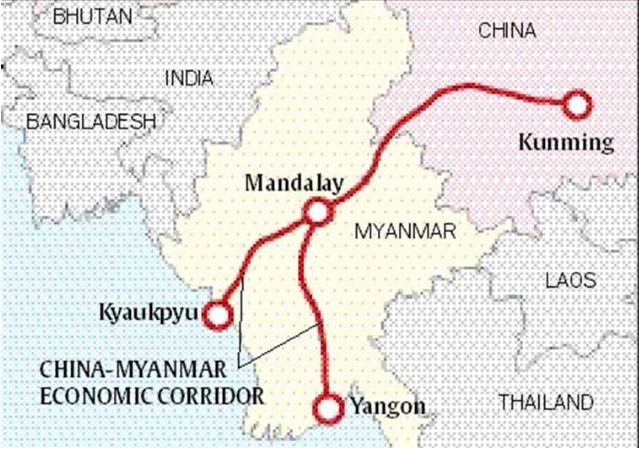International Relations
Proposal for China Myanmar Economic Corridor
- 17 Jan 2020
- 6 min read
Why in News
China’s President Xi Jinping will be visiting Myanmar to mark the 70th anniversary of the establishment of diplomatic relations between China and Myanmar.
- President’s visit will focus on the three pillars of the China Myanmar Economic Corridor (CMEC)— the Kyaukpyu Special Economic Zone, the China-Myanmar Border Economic Cooperation Zone and the New Yangon City.
- CMEC is a branch of the Belt and Road Initiative (BRI) in the Indian Ocean.
- The CMEC to the Bay of Bengal is the replica of the China-Pakistan Economic Corridor (CPEC) that connects Beijing’s western province of Xinjiang to Karachi and Gwadar on the Arabian Sea.
Historical Background of CMEC
- The East India Company and the British Raj were eager to develop connectivity into Yunnan through Burma to promote trade between India and western China.
- In the late 19th century, the Indian Railways surveyed the route for a railway line from the Arakan coast (Myanmar) to Yunnan (China), but could not implement it.
- Thus, China will be implementing the vision of the East India Company.
Key Highlights of Visit
- Connectivity and Infrastructure:
- The visit is likely to pave the way for greater connectivity between China’s southwestern province of Yunnan and the eastern Indian Ocean.
- The major infrastructure projects like the development of a Special Economic Zone (SEZ) and a deep-sea port at Kyaukpyu and the construction of a railway line from the China border to Mandalay in central Myanmar will be discussed.
- The railway will connect Kyaukpyu on the western seaboard of Myanmar and Yangon in the south where the Irrawaddy River flows into the Bay of Bengal.
- The visit is also expected to revive the hydel dam at Myitsone and the copper mining project that had to be suspended a decade ago.
- Economic Relations:
- It will reinforce China’s status as the most important economic partner of Myanmar, and rejuvenate the historic special relationship between the two countries.
- Diplomatic Relations:
- The US and the West that have been critical of Myanmar’s handling of the Rohingya problem. China, in contrast, has played the role of mediator between Myanmar and Bangladesh.
- China is making the case that some of its BRI projects can help alleviate the Rohingya conflict by accelerating the development of the Arakan region.
- By developing ports such as the Gwadar and Kyaukpyu, China aims to lower its strategic dependence on the Malacca straits — the vital trade link between the Indian and the Pacific oceans, which is the Indo-Pacific Command of the U.S.
- The US and the West that have been critical of Myanmar’s handling of the Rohingya problem. China, in contrast, has played the role of mediator between Myanmar and Bangladesh.
- Historical Relations:
- CMEC enforces the centuries old idea of Southern Silk Road by China.
Impact on India
- China’s economic stakes in the Bay of Bengal will signify larger maritime presence and naval engagement in the region which in turn reinforces the string of pearls policy by China.
- The String of pearls is a geopolitical theory referring to the network of Chinese military and commercial facilities extended from the Chinese mainland to Port Sudan in the Horn of Africa.
- But this theory is denied by China and it views its actions as their efforts to strengthen a new maritime Silk Road.
- Like CMEC and CPEC, China is also developing the China-Nepal Economic Corridor (CNEC) which will link Tibet to Nepal. The endpoints of the project will touch the boundaries of the Gangetic plain. Thus three corridors signify the economic as well as strategic rise of China in the Indian subcontinent.
Steps to be Taken by India
- India should focus on making a more effective contribution to Myanmar’s development and security.
- India needs to focus on quickly completing its own infrastructure projects in Myanmar and develop a new strategy for commercial partnership that is in tune with India’s own capabilities and strengths.
- India needs to strengthen its collaboration with like-minded partners like Japan which has a growing economic presence in Myanmar. Thus, India’s Act East Policy and Japan’s Free and Open Indo-Pacific Strategy needs to combine.
- India also needs to revive the dormant dialogue with China on the BCIM corridor involving Bangladesh, China, India and Myanmar.




